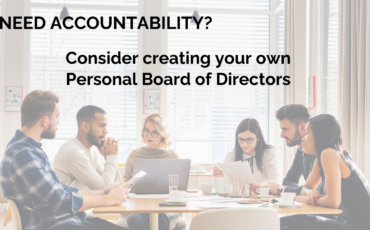In the journey of personal and professional development, having a support system can make all the difference. Just as companies rely on their board of directors for guidance and strategic insights, individuals too can benefit from assembling their own personal board of directors. This advisory team, comprised of mentors, peers, and role models, serves as a compass, offering diverse perspectives and invaluable advice. Here’s how you can curate your personal board of directors to propel yourself towards success.
1. Identify Your Goals and Areas of Growth & Professional Development
Firstly, identify your goals and areas of growth. Before selecting members for your board, it’s crucial to have clarity on what you aim to achieve. Whether it’s advancing in your career, mastering a new skill, or navigating life transitions, having a clear vision will guide your selection process. Define the specific expertise, experiences, and qualities you seek in your advisors. This clarity will ensure that each member brings unique value to the table.
2. Build a Board with Diversity (not quite Team of Rivals, but you get the idea)
Next, diversify your board. Just as a corporate board benefits from a variety of perspectives, your personal board should encompass individuals with diverse backgrounds, skills, and viewpoints. Seek out mentors who have walked the path you aspire to tread, peers who challenge and inspire you, and even individuals from unrelated fields who can offer fresh insights. Embracing diversity within your board will enrich your decision-making process and foster creativity.
3. Choose Board Members You Trust and Can Invest in Too
Furthermore, foster meaningful relationships with your board members. Building a personal board of directors isn’t just about assembling a group of people; it’s about cultivating authentic connections based on trust and mutual respect. Invest time and effort in nurturing these relationships. Actively seek advice, share your successes and challenges, and offer support in return. A strong rapport with your advisors will foster a supportive environment where you can thrive.
4. Listen to Understand and Have a Growth Mindset
Additionally, prioritize feedback and constructive criticism. One of the primary roles of your personal board of directors is to provide honest feedback and guidance. Embrace criticism as a tool for growth rather than as a personal attack. Constructive feedback, even when it’s tough to hear, offers invaluable insights that can propel you forward. Create a culture within your board where candid discussions are encouraged, and everyone feels comfortable offering and receiving feedback.
5. Evolve Your Board as You Evolve & Show Gratitude
Moreover, be open to evolving your board over time. As your goals shift, and you progress in your journey, the composition of your personal board may need to adapt accordingly. Some members may naturally drift away as their expertise becomes less relevant to your current pursuits, while new advisors may emerge whose insights align more closely with your evolving aspirations. Stay flexible and proactive in reshaping your board to ensure it continues to meet your needs effectively. Thank each Board Member for their role and value.
Creating a personal board of directors is a strategic investment in your growth and success. By assembling a diverse team of mentors, peers, and role models, you gain access to invaluable guidance, support, and perspectives. Define your goals, diversify your board, nurture meaningful relationships, embrace feedback, and remain adaptable. With a strong personal board of directors by your side, you’ll be empowered to navigate challenges, seize opportunities, and achieve your fullest potential.

